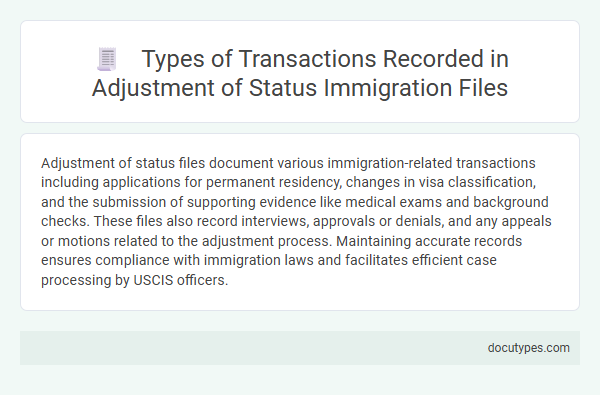Adjustment of status files document various immigration-related transactions including applications for permanent residency, changes in visa classification, and the submission of supporting evidence like medical exams and background checks. These files also record interviews, approvals or denials, and any appeals or motions related to the adjustment process. Maintaining accurate records ensures compliance with immigration laws and facilitates efficient case processing by USCIS officers.
Overview of Adjustment of Status Transactions
| Transaction Type | Description |
|---|---|
| Initial Application Submission | Records the filing of Form I-485, Application to Register Permanent Residence or Adjust Status. |
| Biometrics Appointment | Documents scheduling and completion of fingerprinting and photograph collection for background checks. |
| Request for Evidence (RFE) | Captures instances when additional information or documentation is requested by USCIS to support the application. |
| Interview Scheduling and Results | Logs details about adjustment of status interviews, including dates, outcomes, and any additional notes. |
| Decision Recording | Marks the approval or denial of the adjustment of status application, along with related reasons and notices. |
| Change of Address Notifications | Updates related to any changes in applicant's address during the process, ensuring communication lines remain open. |
| Work and Travel Authorization | Tracks issuance or renewal of Employment Authorization Document (EAD) and Advance Parole (travel permit) tied to your application. |
| Appeals and Motions | Records any formal appeals or motions to reopen/reconsider decisions on the adjustment case. |
Filing of Form I-485 (Application to Register Permanent Residence)
Adjustment of Status files primarily record transactions related to the filing of Form I-485, which is the Application to Register Permanent Residence or Adjust Status. These files document the applicant's biographical information, eligibility evidence, and supporting documentation submitted to U.S. Citizenship and Immigration Services (USCIS). Key transactions include receipt of the application, biometric appointment scheduling, and USCIS interview outcomes, all essential for processing permanent residency status.
Receipt and Acknowledgment Notices
Adjustment of Status files record various transaction types related to an applicant's immigration process. Receipt and Acknowledgment Notices are key documents that confirm the acceptance of submitted forms by USCIS.
Receipt Notices include a unique tracking number that allows applicants to monitor their case status online. Acknowledgment Notices officially verify that USCIS has begun processing the adjustment of status application.
Biometrics Appointment Scheduling and Completion
Adjustment of Status files include detailed records of biometrics appointment scheduling and completion. These appointments collect fingerprints, photographs, and signatures necessary for identity verification and background checks.
Your biometrics data ensures compliance with immigration regulations and supports the processing of your application. Completion of these appointments is a critical step that must be recorded accurately in the adjustment file.
Requests for Evidence (RFE) Issuance and Responses
Adjustment of status files document various transaction types crucial for processing immigration applications. Requests for Evidence (RFE) issuance and responses are key components that impact the file's progression.
- RFE Issuance - The immigration authorities issue Requests for Evidence when additional information or documentation is necessary to evaluate eligibility.
- RFE Response - You must submit detailed and timely responses to RFEs to prevent delays or denials in the adjustment process.
- Document Tracking - All submitted evidence and responses are recorded to maintain a comprehensive case history.
Recording these transactions ensures transparency and accuracy throughout your adjustment of status application.
Interview Scheduling and Results
Adjustment of status files record transactions related to interview scheduling, including appointment dates and times assigned by U.S. Citizenship and Immigration Services (USCIS). The files also document the outcomes of these interviews, such as approval, denial, or requests for additional evidence. These records ensure a comprehensive review of the applicant's eligibility for permanent residency.
Adjudication and Decision Notices
Adjustment of status files contain detailed records of transactions related to the applicant's immigration process. These files include key documents such as adjudication outcomes and formal decision notices issued by USCIS.
- Adjudication Transactions - These entries document the official review and evaluation of the adjustment of status application by immigration officers.
- Decision Notices - Formal letters indicating approval, denial, or requests for additional evidence are recorded as part of the file.
- Status Updates - Changes to the applicant's immigration status and any subsequent procedural steps are noted within the file transactions.
Filing of Supplementary Forms (e.g., Form I-131, I-765)
What types of transactions are recorded in adjustment of status files? These files include the filing of supplementary forms such as Form I-131, Application for Travel Document, and Form I-765, Application for Employment Authorization. Tracking these transactions ensures that Your immigration records are up to date throughout the adjustment process.
Appeals, Motions, and Reconsiderations
Adjustment of Status files meticulously document all transactions related to appeals, motions, and reconsiderations during the immigration process. These records are essential for tracking the progress and legal responses associated with each case.
- Appeals - Formal requests submitted to a higher authority challenging an adverse decision on the adjustment application.
- Motions - Requests filed to reopen or reconsider a decision based on new evidence or legal errors.
- Reconsiderations - Reviews of previous decisions focusing on evaluating the same evidence under different legal interpretations or guidelines.
What Types of Transactions Are Recorded in Adjustment of Status Files? Infographic

